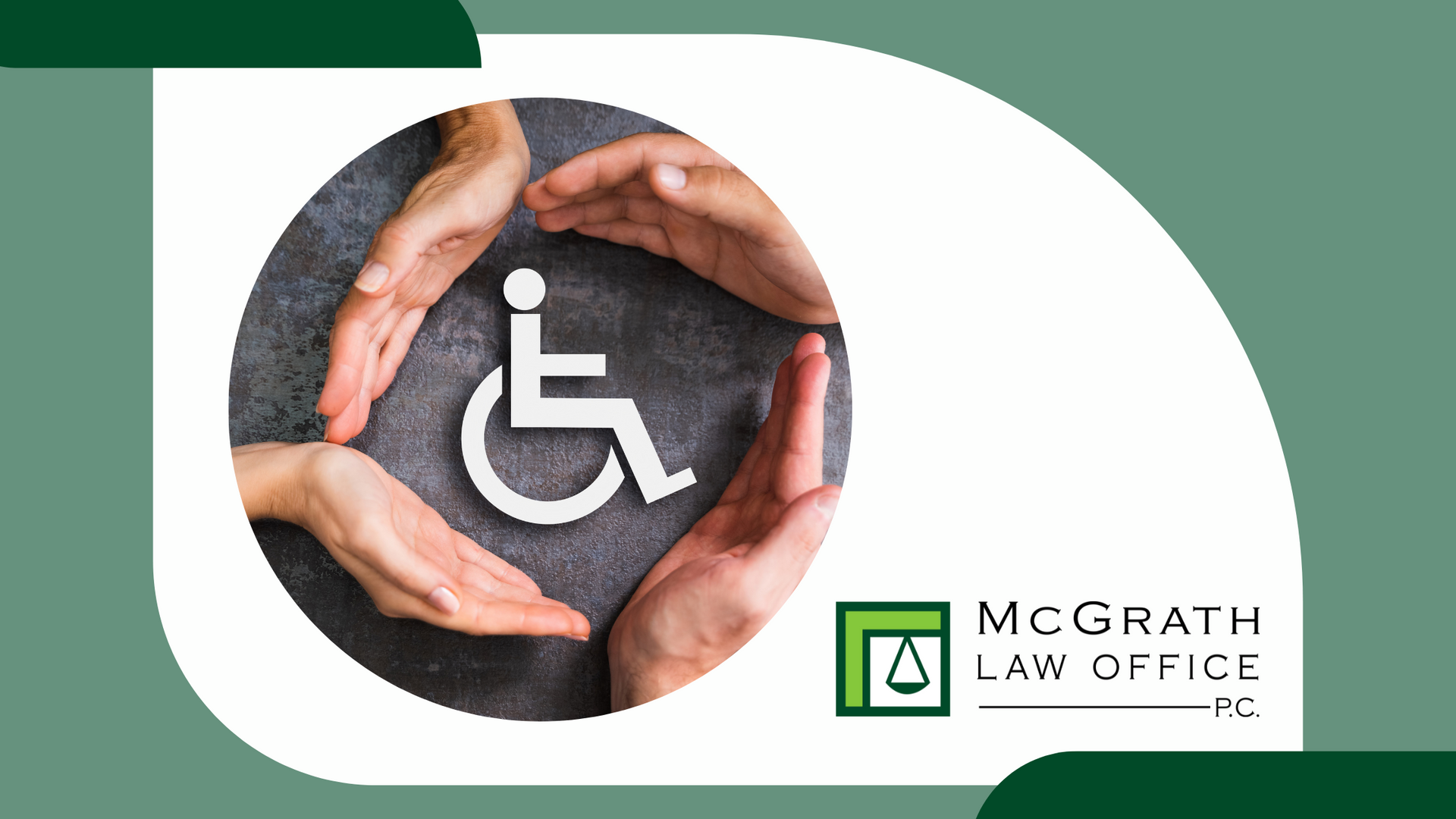Blog
Blog

By McGrath Marketing Team
•
April 2, 2025
Autism Awareness Month is about celebrating diversity, education, and, of course, action. Families, caregivers, and advocates use this time to push for better resources, support inclusion, and secure the future for individuals on the autism spectrum. While education and advocacy play a major role, so do financial and legal planning. One of the most effective tools for ensuring long-term security and quality of life is a special needs trust (SNT). What is a Special Needs Trust? A special needs trust is a legal tool that allows families to set aside money for a loved one with a disability. It’s an estate planning option that doesn’t affect their eligibility for government benefits like Supplemental Security Income (SSI) or Medicaid. Unlike direct financial gifts or inheritances, which could disqualify someone from these crucial programs, an SNT protects access to benefits while providing additional financial support for things like therapy, education, and daily living expenses. The trust is managed by a trustee, who ensures that funds are used appropriately and in the best interest of the beneficiary. Why a Special Needs Trust Matters for Individuals with Autism Government assistance programs have strict asset limits regardless of diagnosis. If a person with autism receives a large sum of money (whether from an inheritance , a legal settlement, or a well-meaning family member), they might lose eligibility for benefits that cover housing, medical care, and daily expenses. A special needs trust keeps assets separate, allowing beneficiaries to maintain access to these critical services. Funding Beyond Basic Needs Government programs cover necessities, but they don’t cover everything that makes life fulfilling. An SNT can pay for: Therapy (occupational, speech, behavioral) Assistive technology Job coaching or vocational training Educational programs Travel and recreation Personal care services Rather than just getting by, individuals with autism can access the resources that help them thrive. Long-Term Financial Security Parents and caregivers often ask, What happens when I’m gone? An SNT answers that question by ensuring funds are managed and distributed properly long after family members are no longer able to provide direct care. Without a trust in place, assets could be mismanaged, or worse, lost due to poor planning. Choosing the Right Type of Trust There are three primary types of special needs trusts: First-Party SNT – Funded with assets that belong to the individual with a disability, such as a legal settlement or an inheritance. Any remaining funds must be used to reimburse Medicaid after the beneficiary’s passing. Third-Party SNT – Created and funded by parents, relatives, or others as part of estate planning. These funds are not subject to Medicaid payback rules. Pooled SNT – Managed by a nonprofit, where multiple beneficiaries’ assets are combined for investment purposes but tracked separately. Each option has benefits depending on the family’s financial situation and long-term goals. Selecting a Trustee The trustee has a significant role: managing funds, making distributions, and ensuring the trust complies with legal and financial rules. This can be a family member, a trusted friend, a professional trustee, or a nonprofit organization that specializes in managing special needs trusts. It’s important to choose someone who understands the beneficiary’s needs and has the ability to handle financial and legal responsibilities. Protecting the Future A special needs trust ensures that individuals with autism have access to the resources they need, without putting their benefits at risk. Whether the goal is securing long-term housing, funding education, or enhancing daily life, an SNT provides structure, stability, and security. If you're considering setting up a special needs trust for a loved one, McGrath Law Office, P.C. can guide you through the process. Call our Mackinaw office at 309-359-3461 or our Morton office at 309-266-6211 to discuss how to protect your family’s future.

By McGrath Marketing Team
•
March 10, 2025
Estate planning is ensuring the people you care about are cared for without unnecessary stress, court battles, or confusion. Trusts are one of the best ways to accomplish this. Depending on the type, a trust can keep your estate out of probate, protect assets, or make sure a loved one with disabilities doesn’t lose government benefits. Revocable (Living) Trust A revocable trust is the most flexible option. While you're alive, it’s yours to manage—you can add or remove assets, change the terms, or even dissolve it if you want. The real benefits kick in later: when you pass away, your assets skip probate court, meaning your family avoids months (or years) of legal headaches. If you ever become unable to manage your finances, a revocable trust also ensures someone you trust can step in without needing court approval. Unfortunately, it usually doesn’t protect assets from creditors or on its own reduce estate taxes. Since you still have control, those assets are legally still yours. Irrevocable Trust An irrevocable trust is the opposite of revocable: once you set it up, you can’t easily change it. That sounds extreme, but there’s a reason for it. Because the assets technically aren’t yours anymore, they can be protected from lawsuits, creditors, or estate taxes in certain cases. This type of trust is useful for asset protection and tax planning. But here’s the trade-off: you’re giving up control. It’s a bigger commitment, but for some, the benefits outweigh the downsides. Irrevocable trusts are often used as a tool to protect assets against the cost of long term care, or as a part of strategies to reduce or avoid estate taxes. Special Needs Trust If you have a child or family member with disabilities, leaving them money directly at your death could accidentally make them ineligible for government benefits like Medicaid or Supplemental Security Income (SSI). A special needs trust avoids this problem. Instead of giving them money directly, the trust holds and manages the assets, allowing them to get financial support without losing essential benefits. The funds can be used for medical expenses, therapies, education, or entertainment—Things that improve their quality of life while keeping their public benefits intact. What to Think About When Setting Up a Trust Who’s Managing It? - A trust is only as good as the person in charge. The trustee can be a family member, but in some cases (especially with more complex trusts) a professional trustee or trust company might be a better choice. Did You Actually Transfer Your Assets? - A trust doesn’t do anything unless your assets are in it. That means retitling property, bank accounts, and investments into the trust’s name. A surprising number of people set up a trust and then forget this step, leaving their assets vulnerable to probate. How Much Control Do You Want? - If keeping full control is important, a revocable trust makes sense. If asset protection or tax benefits matter more, an irrevocable trust might be the better option. Let’s Make Your Estate Plan Make Sense Trusts don’t have to be intimidating or complicated; we’re here to help you find the right fit for your situation. If you're unsure which one makes the most sense for you, let’s talk. Call McGrath Law Office, P.C. at 309-359-3461 (Mackinaw) or 309-266-6211 (Morton)—we’ll walk you through it in plain English.

By McGrath Marketing Team
•
January 31, 2025
From the outside, estate planning is like deciphering a foreign language. Words like "will" and "trust" may sound straightforward, but serve distinct purposes. Together, they can provide a comprehensive plan for the future. The choice between a will or trust depends on your specific goals—whether it’s ensuring your assets avoid probate, protecting your privacy, or planning for unexpected events. Each offers unique benefits and limitations. Timing of Effect A will doesn’t go into effect until after your death. Until then, it holds no authority over your assets. Its primary function is to outline how your property should be distributed and, if applicable, to name guardians for minor children. A trust , on the other hand, can take effect as soon as it’s created and funded. Once assets are placed in the trust, they are managed for the benefit of the trust’s beneficiaries. This allows a trust to function both during your lifetime—offering support if you become incapacitated—and after your death. Probate and Privacy One of the most notable differences between wills and trusts is their relationship to probate . In most cases, a will must go through this court-supervised process to validate its instructions and distribute assets. Probate can be time-consuming, often taking months or even years, and its proceedings are public. This means details about your estate, including assets and beneficiaries, become part of the public record. In contrast, a properly funded trust avoids probate altogether. This allows assets to transfer directly to beneficiaries without court involvement, often saving time and keeping the process private. Trusts can be especially valuable for those who prioritize discretion or wish to avoid lengthy legal delays. Control and Incapacity Planning A will is limited in its scope. It handles asset distribution after death but provides no mechanism for managing your affairs while you’re alive. If you become incapacitated, your loved ones would need to rely on a separate document, like a durable power of attorney, or seek court intervention to manage your assets. A trust , however, offers built-in protections for incapacity. If you can’t manage your affairs, a successor trustee—whom you’ve already named—can step in to oversee the trust’s assets. This avoids needing a court-appointed guardian and ensures continuity in managing your finances. Costs and Complexity Creating a will is often quicker and less expensive upfront, making it an appealing option for those with simple estates. However, the trade-off is that probate costs can accumulate later, potentially reducing the inheritance your beneficiaries receive. A trust , by contrast, requires a greater investment of time and money to establish. It involves retitling assets into the trust and creating a comprehensive plan for management and distribution. However, the upfront effort can pay off in the long run by minimizing probate costs, speeding up asset distribution, and reducing stress for your loved ones. Which One Is Right for You? The decision between a will and a trust isn’t about choosing one over the other—it’s about aligning your estate plan with your goals. A will may suffice if your straightforward priorities include naming guardians for minor children and distributing your assets. However, a trust is often the better choice for those who wish to avoid probate, maintain privacy, or ensure a smooth transition if incapacity strikes. In many cases, the best approach combines both. A will, sometimes called a "pour-over will," can handle any assets not placed in the trust and address guardianship issues. Meanwhile, the trust focuses on managing and distributing assets efficiently and privately. Estate planning doesn’t have to feel overwhelming. Whether you’re considering a will, trust, or both, everyone needs to create a plan that works for them. For personalized guidance, contact McGrath Law Office, P.C. , at our Mackinaw office (309-359-3461) or Morton office (309-266-6211). Let us help you secure peace of mind for you and your family.

By McGrath Marketing Team
•
January 31, 2025
When a loved one passes away, the last thing most families want to deal with is the court system. Yet, that’s exactly what happens in probate. This legal process is meant to confirm the validity of a will (if one exists), pay off debts and taxes, and distribute assets to heirs. While probate serves an important function, it often adds stress to an already emotional time. For some families, probate feels like an added burden. Whether it’s the sometimes long timeline, the unexpected costs, or the lack of privacy, many people find themselves wondering if planning to avoid probate is right for them. Why Families Choose to Avoid Probate Some families choose to avoid probate due to the cost. A simple probate in Illinois ranges between $8,000 and $10,000 on average. Costs increase considerably if difficulties arise during the probate process, such as disputes between family members. Probate can be a slow process. Even simple cases must take at least six months, and more complicated estates —especially those with family disputes or unclear wills—can take years. Your loved ones may receive little, if any, personal access to their inheritance while the probate process is pending. Probate is a public process. Details about your loved one’s assets, debts, and beneficiaries can become part of the public record. Unfortunately, this can also lead to conflict among family members. Disputes over the validity of a will, disagreements about asset distribution, or unresolved family dynamics often come to a head during this process. These conflicts can stretch out the timeline even further and strain relationships permanently. How to Avoid Probate Avoiding probate involves making thoughtful decisions to ease the burden on your loved ones. Here are some effective ways to keep your estate out of court: Living Trusts Simplify the Process - A living trust allows you to transfer ownership of your assets while you’re still alive. You remain in control of your property, but when you pass, the assets in the trust are distributed directly to your beneficiaries without probate. This approach saves time, money, and stress while keeping your estate private. Beneficiary Designations Matter - For accounts like retirement funds or life insurance policies, naming beneficiaries ensures those assets go directly to your chosen individuals. These designations bypass probate entirely, and they’re simple to set up or update. Care and caution must be taken however when planning beneficiary designations to ensure that those beneficiary designations match your wishes if certain contingencies arise, such as a beneficiary passing away before your death. Transfer on Death Instruments (TODI) Can Be a Solution for Real Estate - For real estate, a Transfer on Death Instrument (TODI) allows you the opportunity to designate beneficiaries of your choosing to receive your real estate automatically at your death. This tool can be used in conjunction with other planning strategies to avoid probate, without a trust. However all of the beneficiaries will need to work cohesively to manage the real estate after your death, since the TODI entrusts management of your real estate to all beneficiaries collectively at your death, instead of to one appointed trustee. Planning Ahead with McGrath Law Office, P.C. Planning ahead can ease the burden placed on your loved ones at your death. By utilizing tools like living trusts, TODIs, and updated beneficiary designations, you can help ensure a smoother, faster transition for your family—while saving them time, money, and stress. If you’re feeling overwhelmed or unsure where to begin, that’s okay. These choices can feel daunting, but taking even small steps now can make a big difference later. For personalized guidance, contact McGrath Law Office, P.C. at our Mackinaw office (309-359-3461) or Morton office (309-266-6211). We’re here to help you take control of your future and protect what matters most.
Mackinaw Office
113 S. Main St.
PO Box 139
Mackinaw, IL 61755
Phone
Morton Office
1600 S. Fourth Ave.
Suite 137
Morton, IL 61550
Phone
309-266-6211
MCGRATH LAW OFFICE, P.C.
This website has been built to be accessible for all users. If you experience any difficulty in accessing this website, please contact us for assistance.



